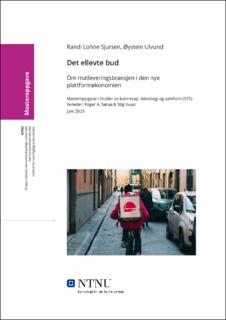| dc.contributor.advisor | Kvaal, Stig | |
| dc.contributor.advisor | Søraa, Roger Andre | |
| dc.contributor.author | Sjursen, Randi Lohne | |
| dc.contributor.author | Ulvund, Øystein | |
| dc.date.accessioned | 2023-07-25T17:22:38Z | |
| dc.date.available | 2023-07-25T17:22:38Z | |
| dc.date.issued | 2023 | |
| dc.identifier | no.ntnu:inspera:143154431:35631962 | |
| dc.identifier.uri | https://hdl.handle.net/11250/3081363 | |
| dc.description.abstract | Denne masteroppgaven undersøker arbeidsmetodene til matleveringsbud i konteksten av plattformøkonomi. Studien tar utgangspunkt i arbeidsdagen til bud som jobber i matleveringsselskapet Foodora. Målet med masteroppgaven er å belyse hvordan disse budene bruker teknologi i arbeidet sitt. Oppgavens problemstilling er: Hvordan organiseres og utøves arbeidspraksiser i plattformselskapet Foodora?
Det empiriske grunnlaget er basert på ni dybdeintervjuer med syv Foodora-bud, ett Wolt-bud og én restauranteier. Analysen er basert på Grounded Theory og bruker teorier fra Studier av kunnskap, teknologi og samfunn (STS), spesifikt skriptteori, domestiseringsteori, og innrammingsteori. For å belyse problemstillingen undersøker vi fem sentrale temaer: (1) Hvilken teknologi bruker Foodora-budene, og hvordan er teknologien tenkt brukt fra selskapets side? (2) Hvordan organiserer budene arbeidsdagen sin for å oppnå fleksibilitet? (3) Hvilke strategier etablerer budene for å jobbe effektivt og øke inntjeningen sin? (4) Hvordan samhandler budene med hverandre, og med andre aktører i selskapet? (5) Hvordan definerer Foodora og Wolt ansettelsesstatusen til leveringsbudene sine?
I analysen viser vi at det utøves et bredt spekter av praksiser i jobben som leveringsbud for Foodora. Budene bruker arbeidsplattformen til å organisere arbeidsdagene sine på ulike måter, etablere strategier, og samhandle med andre aktører i jobben. I tillegg til at budene bruker plattformen til å etablere ulike praksiser, er det også en grad av styring og kontroll involvert i budenes arbeidsdag, som de responderer ulikt på. Vi viser hvordan budenes praksiser springer ut av svært ulike meningsdannelser knyttet til teknologiene de bruker, og at i mangel på konkret informasjon om hvordan disse teknologiene fungerer, gjør de egne fortolkninger og etablerer praksiser basert på egne erfaringer i jobben. I lys av at det etter plattformselskapenes inntog i Norge har oppstått en tidvis konfliktfylt offentlig debatt knyttet til arbeidsformen, undersøker vi også hvordan Foodora rammer inn arbeidet sitt, og vi ser hvordan denne rammen har blitt utfordret av andre aktører. Vi viser at Foodora presenterer arbeidet sitt med fokus på fleksibilitet og autonomi, men at det også er aspekter ved jobben som utfordrer denne beskrivelsen og har betydning for hvordan budene arbeider. | |
| dc.description.abstract | This master's thesis explores how delivery couriers work within the platform economy. The study is based on the workday experiences of Foodora couriers. The aim of the master's thesis is to explore how these couriers use the technologies involved in their job. Our main research question is: How are work practices organized and carried out in the platform company Foodora?
The empirical data is based on nine in-depth interviews with seven Foodora couriers, one Wolt courier, and one restaurant owner. The analysis is inspired by Grounded Theory, and based on theories from Science and Technology Studies, specifically script theory domestication theory, and frame theory. To answer our main research question, we investigate five central themes related to this: (1) What technology do the Foodora couriers use, and how does the company intend for these couriers to utilize it? (2) How do the couriers organize their workday to achieve flexibility? (3) What strategies do couriers establish to work efficiently and increase their earnings? (4) How do the couriers interact with each other, and with other actors in the company? (5) How do Foodora and Wolt frame the employment status of their delivery couriers?
In the analysis, we show that a wide range of practices are carried out in the job as a delivery courier for Foodora. The couriers use the work platform to organize their workdays in various ways, establish strategies, and interact with other actors in the job. In addition to the couriers using the platform to establish different practices, there is also a degree of management and control involved in the courier's workday, to which they respond differently. We show how the couriers' practices originate from very different formations of meaning related to the technologies they use, and that in the absence of specific information on how these technologies work, they make their own interpretations and establish practices based on their own experiences in the job. In light of the fact that there has been a sometimes conflict-filled public debate related to this form of work since the platform companies' arrival in Norway, we also investigate how Foodora frames their work, and we see how this frame has been challenged by other actors. We show that Foodora presents their work with a focus on flexibility and autonomy, but there are also aspects of the job that challenge this description and have an impact on how the couriers work. | |
| dc.language | nob | |
| dc.publisher | NTNU | |
| dc.title | Det ellevte bud: Om matleveringsbransjen i den nye plattformøkonomien | |
| dc.type | Master thesis | |
